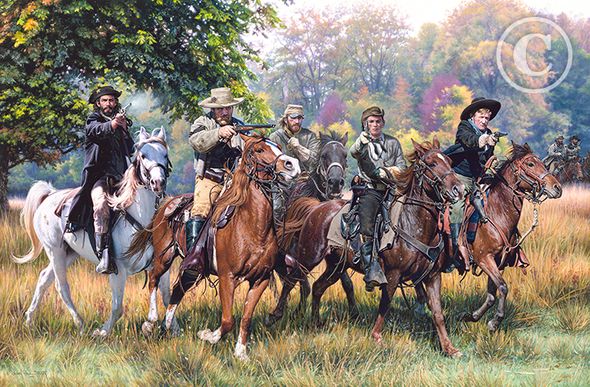
John Paul Strain Hand Signed and Numbered Limited Edition:"Jesse James"
Artist: John Paul Strain
Title: Jesse James (Bloody Bill Anderson, Sgt. John Baker, John Jarrette, Jesse James, Frank James Battle of Centralia, Missouri - September 27, 1864)
Size: 19" x 29" - Additional sizes and mediums will be listed for selection from the Drop down box.
Edition Size: Artist Hand Signed and numbered Limted Edition, COA included.
Medium: Lithograph on Paper with Giclee Canvas Editions - Select available options from drop down box.
About the Art: The Civil War was fought differently in Kansas and Missouri than the rest of the country. In Virginia, Maryland, and Tennessee, armies of thousands would face each other in great lines of battle. In the West, battles were more often skirmishes of less than a couple of hundred men. Guerrilla tactics, surprise attacks, and ambush were the tools of the day and southerners fought by the code of the feud. The population had mixed loyalties between North or South, which caused suspicion as to who was friend or foe. Adding to the confusion southern combatants often did not wear uniforms and sometimes dressed in federal jackets. It was in the early summer of 1864 that a young 16 year old Jesse James joined Bloody Bill Anderson’s Raiders under the command of William Quantrill to ride with his older brother Frank.
On the afternoon of September 27th Anderson and about 80 of his men rode out of the federal town of Centralia, leaving behind death and destruction. Much of the town was on fire and 22 non-combatant federal soldiers had been killed.
When Anderson and his men rejoined Captain George Todd’s cavalry unit back at camp, word spread of what had happened. Captain Todd chastised Anderson for what had been done. What they didn’t know was that the federals were already in pursuit. Federal Major AVE Johnston commander of the 39th infantry were mounted and on the trail with about 155 troops. After viewing the destruction and death in Centralia the federal commander vowed revenge, and a black flag was carried by his column indicating no quarter was to be given by his men for any wounded or captured prisoners.
Major Johnston’s column was soon discovered by Anderson’s rear guard scouts led by Dave Pool who galloped back to camp warning their brethren. Instantly the camp jumped into action as Anderson’s and Todd’s raiders readied for battle. As the rebels mounted their horses they formed into squads of ten to twenty men. Two miles from Centralia at the rise of a golden yellow hayfield the federals formed a line of battle on foot. Johnston’s men were infantry soldiers carrying long-barreled, muzzle loading Enfield rifles. Johnston ordered his men to fix bayonets.
Frank James would later recount, “John Koger, a funny fellow in our ranks, watched the Yankees get down from their horses, and said: ‘Why, the fools are going to fight on foot! God help em.” Anderson riding his new mount, smiled and leaned over to Archie Clement and said, “Not a damned revolver in the crowd!” But actually commander Johnston stood next to his horse with a six shooter in his hand.
The troopers dismounted their horses, checked their equipment, tighten their horse’s girths, and remounted pulling their pistols. At the command they moved forward in line, slowly at first. The line move toward the enemy at a walk, then to a trot up the hill. They heard the federal commander scream “ready aim fire!” Frank James said when they heard the enemy officer’s command, “We were lying behind our horses (necks), a trick that Comanche Indians practiced.” When the federals fired their rifles nearly all the shots went over their heads. But three raiders were hit. Two of them, Richard Kinney and Frank Shepherd were Frank’s best friends riding on either side of him. Shepherd was killed out right and fell from his horse. Kinney was shot and pulled back, although he was able to cling to his horse. He would die soon afterward. Several horses went down as well. The federal line only got off only one shot. At 200 yards Anderson shouted “Charge” and with a bloodcurdling rebel yell the line leaped into a thundering gallop. Frank continued, “On up the hill, almost in the twinkling of an eye we were on the Yankee line.” The federal line quickly broke and a wild panic of fighting and fleeing took place. During the fight Jesse engaged and killed Major Johnston the union commander. All the federals who stood their ground and fought were killed, including a number who ran away. Ten of the raiders were wounded, a number had been bayoneted, and three were killed. Describing the battle Frank James said, “We never met many Federal soldiers that would fight us on equal terms. They would either outnumber us or would run away.” The battle was Jesse’s first big victory.
After the war, Jesse James and his brother Frank would become some of the most notorious outlaws of the West.
Title: Jesse James (Bloody Bill Anderson, Sgt. John Baker, John Jarrette, Jesse James, Frank James Battle of Centralia, Missouri - September 27, 1864)
Size: 19" x 29" - Additional sizes and mediums will be listed for selection from the Drop down box.
Edition Size: Artist Hand Signed and numbered Limted Edition, COA included.
Medium: Lithograph on Paper with Giclee Canvas Editions - Select available options from drop down box.
About the Art: The Civil War was fought differently in Kansas and Missouri than the rest of the country. In Virginia, Maryland, and Tennessee, armies of thousands would face each other in great lines of battle. In the West, battles were more often skirmishes of less than a couple of hundred men. Guerrilla tactics, surprise attacks, and ambush were the tools of the day and southerners fought by the code of the feud. The population had mixed loyalties between North or South, which caused suspicion as to who was friend or foe. Adding to the confusion southern combatants often did not wear uniforms and sometimes dressed in federal jackets. It was in the early summer of 1864 that a young 16 year old Jesse James joined Bloody Bill Anderson’s Raiders under the command of William Quantrill to ride with his older brother Frank.
On the afternoon of September 27th Anderson and about 80 of his men rode out of the federal town of Centralia, leaving behind death and destruction. Much of the town was on fire and 22 non-combatant federal soldiers had been killed.
When Anderson and his men rejoined Captain George Todd’s cavalry unit back at camp, word spread of what had happened. Captain Todd chastised Anderson for what had been done. What they didn’t know was that the federals were already in pursuit. Federal Major AVE Johnston commander of the 39th infantry were mounted and on the trail with about 155 troops. After viewing the destruction and death in Centralia the federal commander vowed revenge, and a black flag was carried by his column indicating no quarter was to be given by his men for any wounded or captured prisoners.
Major Johnston’s column was soon discovered by Anderson’s rear guard scouts led by Dave Pool who galloped back to camp warning their brethren. Instantly the camp jumped into action as Anderson’s and Todd’s raiders readied for battle. As the rebels mounted their horses they formed into squads of ten to twenty men. Two miles from Centralia at the rise of a golden yellow hayfield the federals formed a line of battle on foot. Johnston’s men were infantry soldiers carrying long-barreled, muzzle loading Enfield rifles. Johnston ordered his men to fix bayonets.
Frank James would later recount, “John Koger, a funny fellow in our ranks, watched the Yankees get down from their horses, and said: ‘Why, the fools are going to fight on foot! God help em.” Anderson riding his new mount, smiled and leaned over to Archie Clement and said, “Not a damned revolver in the crowd!” But actually commander Johnston stood next to his horse with a six shooter in his hand.
The troopers dismounted their horses, checked their equipment, tighten their horse’s girths, and remounted pulling their pistols. At the command they moved forward in line, slowly at first. The line move toward the enemy at a walk, then to a trot up the hill. They heard the federal commander scream “ready aim fire!” Frank James said when they heard the enemy officer’s command, “We were lying behind our horses (necks), a trick that Comanche Indians practiced.” When the federals fired their rifles nearly all the shots went over their heads. But three raiders were hit. Two of them, Richard Kinney and Frank Shepherd were Frank’s best friends riding on either side of him. Shepherd was killed out right and fell from his horse. Kinney was shot and pulled back, although he was able to cling to his horse. He would die soon afterward. Several horses went down as well. The federal line only got off only one shot. At 200 yards Anderson shouted “Charge” and with a bloodcurdling rebel yell the line leaped into a thundering gallop. Frank continued, “On up the hill, almost in the twinkling of an eye we were on the Yankee line.” The federal line quickly broke and a wild panic of fighting and fleeing took place. During the fight Jesse engaged and killed Major Johnston the union commander. All the federals who stood their ground and fought were killed, including a number who ran away. Ten of the raiders were wounded, a number had been bayoneted, and three were killed. Describing the battle Frank James said, “We never met many Federal soldiers that would fight us on equal terms. They would either outnumber us or would run away.” The battle was Jesse’s first big victory.
After the war, Jesse James and his brother Frank would become some of the most notorious outlaws of the West.













